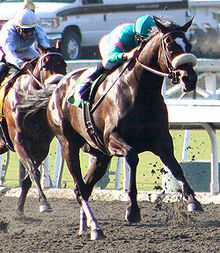In an article with the subheading "Racing to the Grave," PETA accuses the horse racing industry of extreme animal abuse because of general racing practices, the use of drugs, race fixing, injuries, and end of life practices that affect race horses, all for the sake of a multibillion-dollar industry.
Among their arguments against practices of racing horses are the following:
- Horses are not built for the speed required in races
- Training of race horses begins before skeletal systems can handle pressure of racing
- Injuries are hard for veterinarians to diagnose and many horses are forced to race while injuried
- Many race horses either die of racing injuries are their careers end at the slaughterhouse
- Use of drugs to keep injured horses running and of illegal performance enhancing drugs are prevalent in racing
According to PETA, even the so-called 'winners' lose because at the end of their careers, they often end up having to endure being transported under inhumane conditions to slaughter houses where practices are questionable, or they are abandoned and left to find homes through rescues or euthanized for convenience.
PETA maintains that people should work to end "this exploitative 'sport'" by:
- Refusing to patronize existing tracks and lobby against the construction of new tracks
- Supporting PETA's efforts to ensure that racing regulations are reformed and enforced. While horse racing should be eliminated entirely, the horses would benefit from a zero-tolerance drug policy, turf (grass) tracks only, a ban on whipping, and competitive racing only after their third birthdays.
- Educating friends and family about the tragic lives that racehorses lead.

